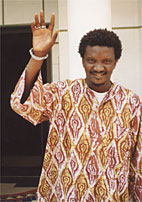Poet Thierno Seydou Sall Visits from Dakar, Senegal
 Senegalese poet Thierno Seydou Sall has been writing poetry since he was a small child, when, he says, “my head was full of crazy ideas” that he felt set him apart from his society. He has been a wandering poet since his early 20’s. He has published six books of poetry, some of which have been translated into as many as seven languages. Today he finds his primary poetic inspiration among rural villagers. “My fate as a poet is tied to the fate of African village culture,” he says.
Senegalese poet Thierno Seydou Sall has been writing poetry since he was a small child, when, he says, “my head was full of crazy ideas” that he felt set him apart from his society. He has been a wandering poet since his early 20’s. He has published six books of poetry, some of which have been translated into as many as seven languages. Today he finds his primary poetic inspiration among rural villagers. “My fate as a poet is tied to the fate of African village culture,” he says.
“In a country dominated by the powers of religion and the state,” says the poet, “one must believe fundamentally in one’s own dream, one’s own vision, and find a way to sustain it, like a powerful counter-power.”
Thierno Sall, the person, is poignant affirmation of another of De Tocqueville’s enduring insights into the transition from Traditionalism to Modernity. De Tocqueville chronicled how democracy in America liberated the individual to pursue self-interest. While this brought great benefits to society for a time, he warned prophetically that there could come a moment when self-interest became selfishness and society would become a hollow rather than a civil place. What will then be required, he might have imagined, are extraordinary individualists like Thierno Sall, who understand that their individual destiny is inextricably linked to that of society. This rich understanding of what it is to be human runs throughout Thierno’s poetry, as it does in the perennial African philosophy of Ubuntu, which is best known by the aphorism, “A person becomes a person by means of other people.”
Lunch will be served.